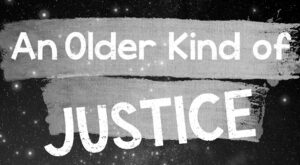An interview with the author – An Older Kind of Justice

I sat down with my friend and fellow writer Allie E. to talk about An Older Kind of Justice. Here are some excerpts from our conversation:
A.E. So tell me what inspired you to write Older Justice. Why this book? Why now?
A.B. It happened now because I ran out of excuses [laughs]. Actually, it felt as though the book was writing itself. We could have a long conversation about where ideas come from, but the shortest answer is, I created a scenario, put some characters in it, and watched what they did, what they said to each other. I did have some themes I wanted to explore, such as the idea that we think we know who we are, what our moral boundaries are, when everything is going great. But when we have our back against the wall, it’s new territory.
A.E. What was the writing process like for you? No two books are the same for a writer, what did this one mean for you?
A.B. It was intense, and emotional. I thought I was just making up good story, but the deeper I got into it, the more I realized that I was working through my own issues of loss, grief, fear, situations where I no longer recognized myself. I’d find myself waking up in the middle of the night crying over something in the book, and I’d realize that it was something in my own past that I needed to understand. And there were some scenes that were almost impossible. To write something really emotional, you have to be in the character’s head, feel what they’re feeling, react the way they would. It was quite painful to experience what my characters were feeling, to be them in those scenes.
A.E. I think that’s what made it work, though, they seemed like real people. Do you have a favorite character?
A.B. They’re all my favorite [laughs]. But if I had to pick one character who could exist as a person in my life, it would be Johnny. We all want someone like Johnny, a wise friend and mentor, who accepts us just the way we are.
A.E. So your protagonist, Cassandra. Is she you, in disguise? It’s impossible not to notice that you also worked for Big Money Inc, and you walked away from it to live in a tiny house and write a book.
A.B. No, she is not me! There are some facts of her life that I lifted from my own, but she is her own person. I wanted to take a person with a certain kind of background, and put them into a situation where everything that they had come to depend on was no longer available, and see what that did to them. Cass thought she knew herself pretty well, but that was only because she hadn’t really stepped out of her comfort zone.
A.E. And is the Fields of Concorde a real place? Based on where you live?
A.B. It is entirely fictional, sort of an idealized setting. The Fields is a very diverse and special place, where people are drawn because they need something, even if they don’t know what that is. Maybe they were brought there because of some special intention, to resolve some issue, or maybe it’s coincidence. I leave it to the reader to decide.
A.E. Successful fiction is always about struggle, and challenge, and growth. Cass, and Jake, for instance, both face some pretty serious situations, and it changes them.
A.B. Yeah, two very different people. Jake has no idea how smart he is, but he is very in touch with his emotions. And he was a pretty low self image, which hurts him all the time. Cass is confident, and she’s always relied on being really smart, but when she finds herself in an emotional situation, things start to slide out of control. She wants to stay in her comfort zone, which is a very cerebral place, until that doesn’t work any more. This happens to her over and over.
A.E. I didn’t want the book to end – are we going to see any more of the Fields of Concorde?
A.B. It’s really not up to me! If the muse knocks on the door, we might get another installment.

